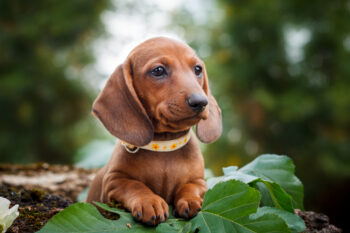Male & Female Bouvier des Flandres Weights & Heights by Age
The Bouvier des Flandres, a robust and powerful breed originating from the Flanders region, is admired for its versatile working capabilities and loyal companionship. With a strong, compact build, the average weight for males ranges between 80 to 120 pounds (36 to 54 kilograms), while females are slightly lighter, typically weighing between 60 to 80 pounds (27 to 36 kilograms). Males stand at an average height of 24.5 to 27.5 inches (62 to 70 cm) at the withers, with females slightly shorter, measuring around 23.5 to 26.5 inches (60 to 67 cm). Their substantial physique is complemented by a rugged appearance, characterized by a dense, weather-resistant coat.
Male Bouvier des Flandres Weights & Heights by Age
The following chart contains the average weights and heights of male Bouvier des Flandres from newborn to 3 years of age. Please note these are only averages. Always consult with your veterinarian if you have any concerns about your Bouvier des Flandres’ growth.
Age (Months/Years)
Weight (lbs)
Weight (kg)
Height (in)
Height (cm)
0-1
8-12
3.6-5.4
8-10
20-25
2
20-30
9-13.6
12-15
30-38
3
40-50
18-22.7
15-18
38-45
4
50-60
22.7-27.2
18-20
45-51
5
60-70
27.2-31.8
20-22
51-56
6
70-80
31.8-36.3
22-24
56-61
7
80-90
36.3-40.8
23-25
58-63
8
90-100
40.8-45.4
24-26
61-66
9-12
95-110
43.1-49.9
24.5-27.5
62-70
2 Years
95-120
43.1-54.4
24.5-27.5
62-70
3 Years
95-120
43.1-54.4
24.5-27.5
62-70
Female Bouvier des Flandres Weights & Heights by Age
The following chart contains the average weights and heights of female Bouvier des Flandres from newborn to 3 years of age. Please note these are only averages. Always consult with your veterinarian if you have any concerns about your Bouvier des Flandres’ growth.
Age (Months/Years)
Weight (lbs)
Weight (kg)
Height (in)
Height (cm)
0-1
7-10
3.2-4.5
7-9
18-23
2
18-25
8.2-11.3
11-14
28-35
3
35-45
15.9-20.4
14-17
35-43
4
45-55
20.4-24.9
17-19
43-48
5
55-65
24.9-29.5
19-21
48-53
6
65-75
29.5-34
21-23
53-58
7
70-80
31.8-36.3
22-24
56-61
8
75-85
34-38.6
23-25
58-63
9-12
80-90
36.3-40.8
23.5-26.5
60-67
2 Years
80-100
36.3-45.4
23.5-26.5
60-67
3 Years
80-100
36.3-45.4
23.5-26.5
60-67
These tables are based on general guidelines and can vary greatly depending on individual dogs. Always consult with a veterinarian or professional breeder for more specific information about your pet’s growth and development.
FAQs about a Bouvier des Flandres Puppy’s Growth and Development
1. How fast will my Bouvier des Flandres puppy grow?
Bouvier des Flandres puppies experience rapid growth during their first six months, gradually slowing down as they approach their first year. This breed continues to fill out in muscle and bulk up until about two to three years of age. Monitoring your puppy’s growth through regular weigh-ins and vet check-ups is crucial for ensuring they are on the right track.
2. What is the average weight of a Bouvier des Flandres puppy at 3 months?
At 3 months, a Bouvier des Flandres puppy typically weighs between 40 to 50 pounds (18 to 22.7 kilograms). This range can vary with each puppy, so it’s important to consider diet, exercise, and health when evaluating your puppy’s growth.
3. How tall should my Bouvier des Flandres puppy be at 6 months?
By 6 months, your Bouvier des Flandres puppy might be around 22 to 24 inches (56 to 61 cm) tall at the withers. Keep in mind, individual growth can vary, and puppies may grow at different rates.
4. Is there a difference in growth rate between male and female Bouvier des Flandres?
Yes, male Bouvier des Flandres puppies generally grow larger and heavier than their female counterparts. This difference becomes more noticeable after the first few months, with males typically having a more pronounced growth in both weight and height.
5. How can I tell if my Bouvier des Flandres puppy is overweight?
Check if you can feel your puppy’s ribs without a thick layer of fat over them, and observe whether they have a visible waist when viewed from above. An overweight puppy may have less visible body definition and may show signs of decreased energy. Regular vet check-ups can help monitor their weight.
6. What should I feed my Bouvier des Flandres puppy to ensure proper growth?
Feed your Bouvier des Flandres puppy a high-quality diet formulated for large-breed puppies. These diets help regulate growth to prevent rapid growth spurts that can lead to skeletal and joint problems. Consult with your vet for specific brand recommendations and portion sizes.
7. How much exercise does my Bouvier des Flandres puppy need?
Moderate exercise is crucial for healthy growth; short walks, play sessions, and controlled socialization activities are beneficial. Avoid strenuous activities that can strain their developing joints, like jumping or running on hard surfaces, until they are fully grown.
8. When will my Bouvier des Flandres puppy stop growing?
Most will reach their full height by 12 to 18 months, but they will continue to gain muscle and fill out until about 2 to 3 years of age. The rate of growth will slow significantly after their first year.
9. Why does my Bouvier des Flandres puppy seem to be growing unevenly?
It’s not uncommon for puppies, especially large breeds like the Bouvier des Flandres, to go through awkward growth phases where their paws, ears, or legs grow faster than the rest of their body. This uneven growth is usually temporary and evens out with time.
10. How can genetics affect my Bouvier des Flandres puppy’s growth?
Genetics play a significant role in determining the size your puppy will grow to be. Looking at the size of the puppy’s parents can give you a good indication of their potential adult size. However, nutrition and health care also significantly influence growth.
11. Can neutering or spaying my Bouvier des Flandres puppy affect their growth?
Neutering or spaying can slightly affect your puppy’s growth, often leading to a slightly taller stature as the closure of growth plates may be delayed. Discuss the best timing for these procedures with your vet to minimize any potential impact on growth.
12. What are common health problems that could affect my Bouvier des Flandres puppy’s growth?
Hip dysplasia, bloat, and joint issues are some health concerns for Bouviers. Proper diet, avoiding overexertion during the growth phase, and regular vet checks can help mitigate these risks and ensure healthy development.
13. How do I know if my Bouvier des Flandres puppy is growing normally?
Regular vet check-ups, monitoring weight and height monthly, and comparing them against breed-specific growth charts can help ensure your puppy is on the right track. Sudden changes in growth rate should be discussed with your vet.
14. What are the signs of developmental issues in Bouvier des Flandres puppies?
Limping, difficulty in moving, reluctance to play, or an uneven gait can indicate developmental issues. Early intervention by a veterinarian can address many of these concerns effectively.
15. How do environmental factors influence my Bouvier des Flandres puppy’s growth?
Adequate space for exercise, a safe environment, and proper nutrition all play crucial roles in healthy development. Stressful environments or poor nutrition can negatively impact growth and overall health.
16. Should I use supplements to enhance my Bouvier des Flandres puppy’s growth?
In most cases, a balanced diet specifically designed for large-breed puppies will provide all the necessary nutrients for growth. Supplements can sometimes disrupt this balance and should only be used under veterinary guidance.
17. How often should I feed my growing Bouvier des Flandres puppy?
Up to six months old, puppies should be fed three to four times a day. After six months, you can reduce feeding to twice daily. Consistent meal times and controlled portions help prevent overeating and obesity.
18. What is bloat, and how can I prevent it in my Bouvier des Flandres?
Bloat, or gastric torsion, is a serious condition where the stomach fills with air and twists. Preventative measures include feeding smaller, more frequent meals, avoiding vigorous exercise around feeding times, and encouraging slow eating.
19. Can I use adult dog food for my Bouvier des Flandres puppy?
It is not recommended to feed a puppy adult dog food. Puppies have different nutritional needs to support their rapid growth and development, and large-breed puppy formulas are specifically designed to meet these requirements.
20. How do I transition my Bouvier des Flandres puppy to adult food?
Transition to adult food should be gradual, over a period of 7 to 10 days, mixing increasing amounts of adult food with decreasing amounts of puppy food. This helps prevent digestive upset and ensures a smooth dietary transition as your puppy matures.
The post Male & Female Bouvier des Flandres Weights & Heights by Age appeared first on iHeartDogs.com.


